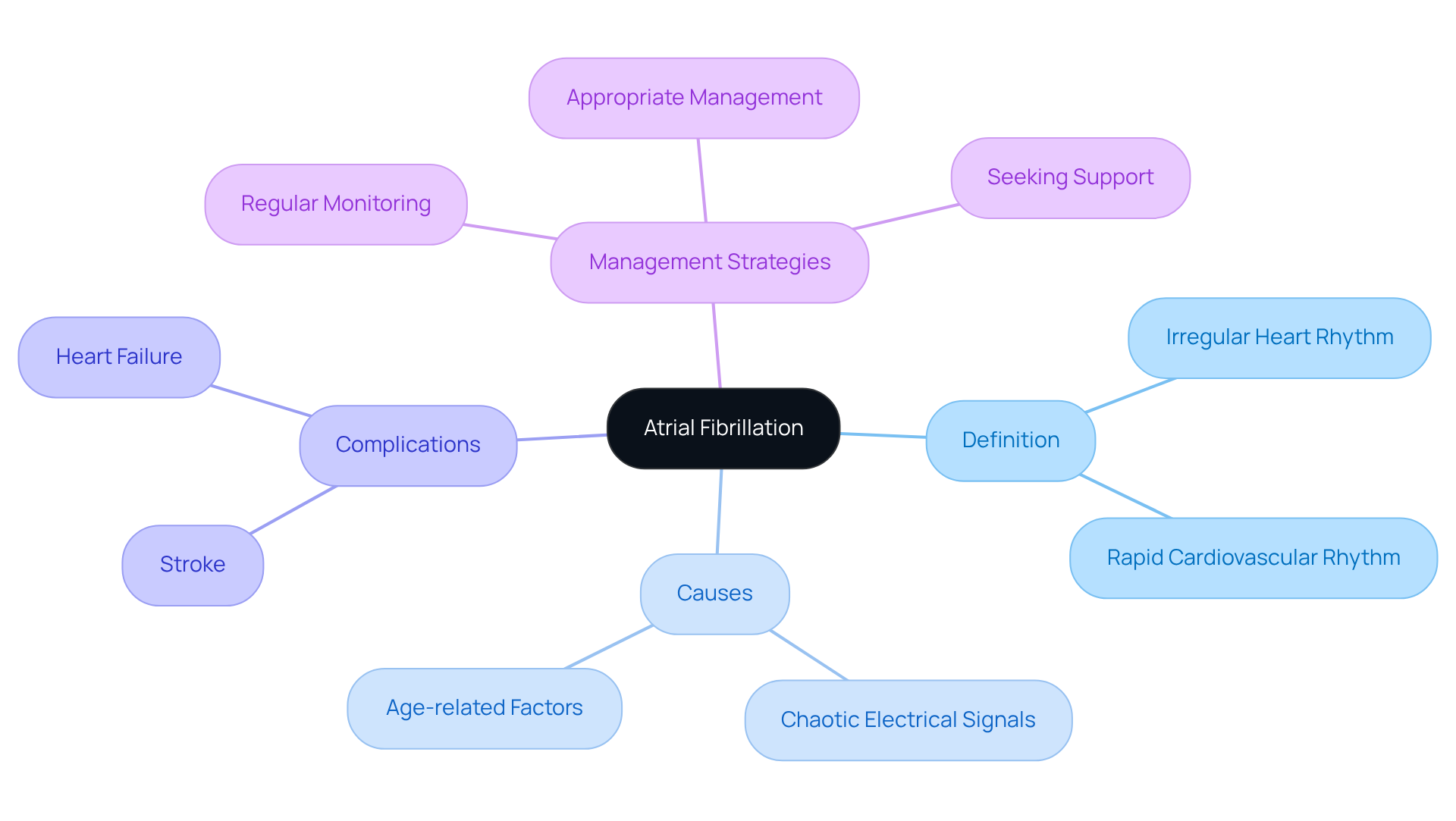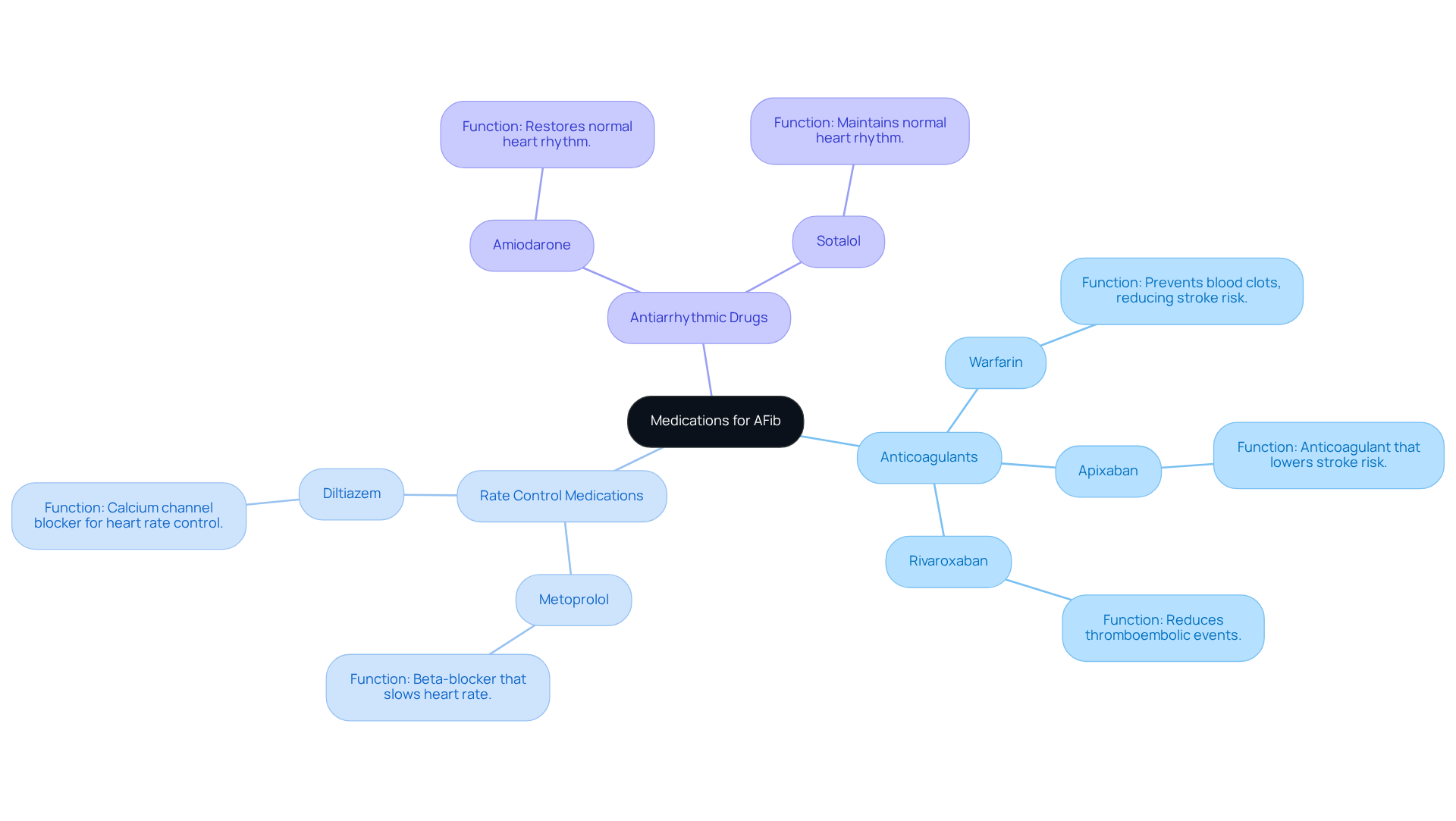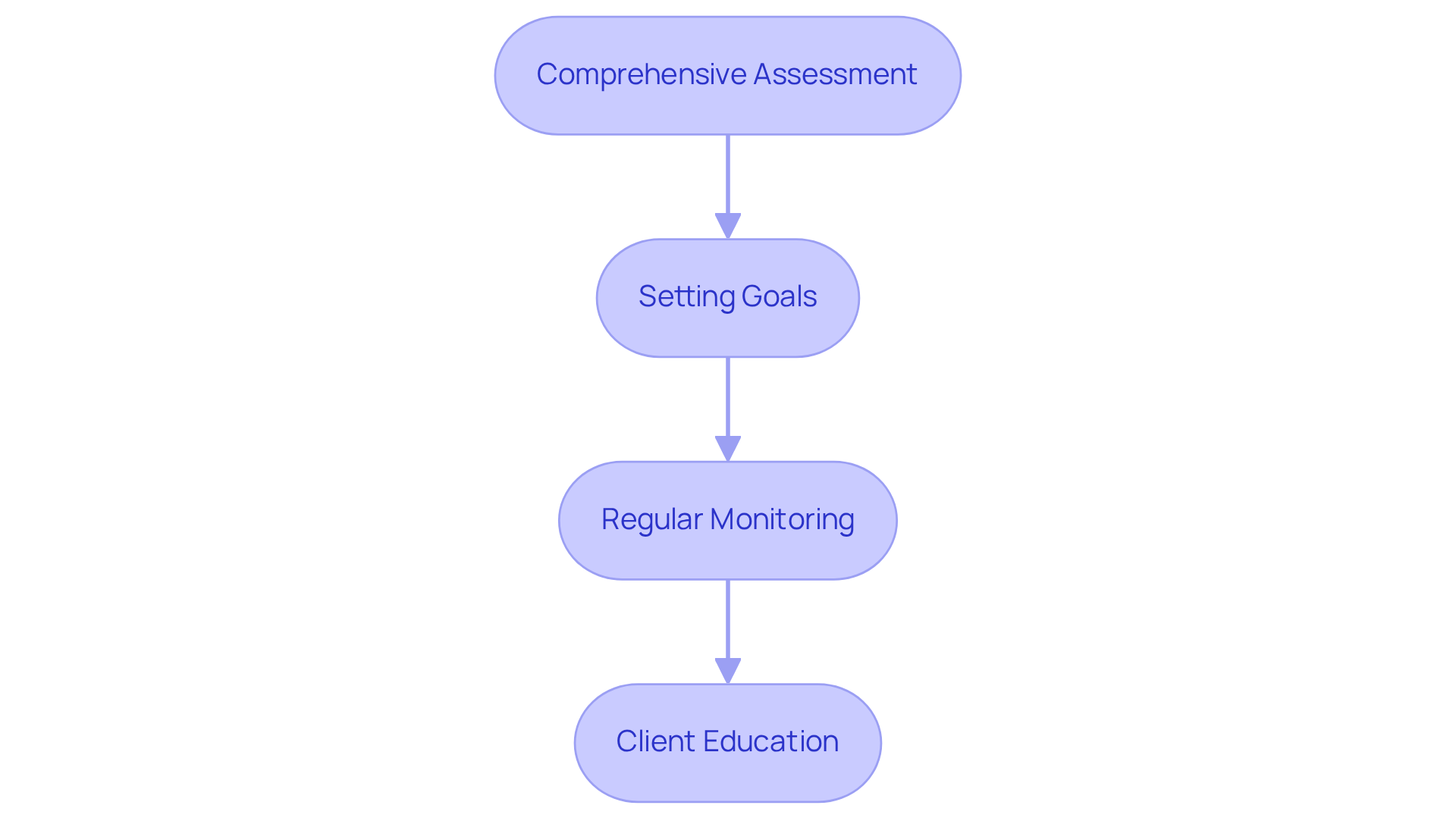


This article gently guides you through the understanding and management of medications for atrial fibrillation (AFib), specifically tailored for our elderly loved ones. It highlights the vital role of anticoagulants, rate control agents, and antiarrhythmic drugs in reducing the risks associated with AFib. Moreover, it emphasizes the importance of personalized treatment plans and being aware of potential side effects, which are crucial for maintaining heart health and enhancing the quality of life for older adults.
As we navigate these health concerns, it's essential to remember that each patient's journey is unique. Personalized care can make a significant difference, and being informed helps in making the right choices. If you or a loved one are feeling uncertain about managing AFib, know that support is available. Together, we can ensure that the path to heart health is as smooth and comforting as possible.
Atrial fibrillation is a condition that can lead to an irregular heart rhythm, which poses significant risks, especially for our elderly loved ones. These risks include:
Understanding the various medications available to manage this condition is vital for older adults who wish to maintain their health and quality of life. However, with so many treatment options available, it can feel overwhelming to navigate potential side effects and the need for personalized care.
How can elderly patients effectively manage their atrial fibrillation while ensuring their treatment aligns with their unique health needs? Rest assured, there are ways to approach this with care and support.
Atrial fibrillation is an irregular and often rapid cardiovascular rhythm that can lead to serious complications, such as stroke and heart failure. For older individuals, this condition can be particularly concerning due to the increased risk of these complications. When the upper chambers of the heart, known as the atria, receive chaotic electrical signals, they may quiver instead of contracting effectively. This quivering can cause blood to pool in the atria, raising the risk of clot formation.
Understanding atrial fibrillation is essential for older adults, as it significantly impacts their and overall quality of life. How might this condition affect your daily activities? Regular monitoring and appropriate management are crucial steps in reducing these risks and ensuring heart function remains strong. Taking action now can help you maintain your health and well-being.
If you or a loved one is experiencing symptoms of atrial fibrillation, please reach out for support. You are not alone in this journey, and there are resources available to help you navigate these challenges. Together, we can work towards better heart health and a more fulfilling life.

Managing atrial fibrillation (AFib) can feel overwhelming, but understanding the medication for afib available can offer some comfort. The three primary types of medication for afib include anticoagulants, rate control agents, and antiarrhythmic substances used to help manage the condition.
If you have any concerns or questions about these medications, please don’t hesitate to reach out for support. You deserve care that addresses your needs and helps you feel secure in your health journey.

Managing atrial fibrillation (AFib) can feel overwhelming, but understanding how medication for AFib works can provide comfort and clarity. These medications operate through various mechanisms, each designed to help you feel more secure in your health journey.
Understanding these mechanisms can empower you to follow your treatment plan and appreciate the in managing AFib. Remember, you are not alone in this journey, and reaching out for support can make a significant difference in your experience.

Managing AFib is crucial for your health, but it’s important to be aware that medication for AFib can have side effects and risks. Understanding these can help you feel more .
Remember, understanding these side effects is a key part of managing your health. You are not alone in this; your healthcare team is here to support you every step of the way. If you have any concerns or questions, please reach out for guidance. Your health and well-being are our top priorities.

Creating a customized treatment strategy that includes medication for afib is a journey best taken together with your healthcare provider. At Amavita Heart and Vascular Health®, we emphasize innovative and compassionate care, ensuring that you feel supported every step of the way.
By collaborating closely with our compassionate healthcare providers at Amavita, you can develop a treatment plan that is uniquely tailored to your needs. This partnership ultimately leads to better management of AFib and an improved quality of life, reassuring you that you are not alone on this journey.

Atrial fibrillation presents a significant health challenge, particularly for elderly patients who face increased risks of complications like stroke and heart failure. It’s crucial to understand the various medications available for managing AFib, as this knowledge empowers individuals to take control of their health. By grasping how these medications function and the importance of personalized treatment plans, patients can collaborate closely with healthcare providers to achieve optimal outcomes.
This guide has explored the types of medications for AFib, including:
Each serving unique functions in managing the condition. Key insights into their mechanisms, potential side effects, and the importance of regular monitoring have been highlighted. This reinforces the necessity of informed decision-making in treatment strategies, ensuring that you feel supported in your choices.
Ultimately, the journey to effectively managing atrial fibrillation is a collaborative effort between you and your healthcare providers. By prioritizing communication, understanding treatment options, and addressing potential risks, you can navigate your health journey with confidence. Embracing this proactive approach not only enhances your quality of life but also fosters a sense of security in managing AFib. Remember, you are not alone in your quest for better heart health; support is always available to guide you.
What is atrial fibrillation and how does it affect heart health?
Atrial fibrillation is an irregular and often rapid heart rhythm that can lead to serious complications such as stroke and heart failure. It occurs when the atria receive chaotic electrical signals, causing them to quiver instead of contract effectively, which can lead to blood pooling and increased risk of clot formation.
Why is atrial fibrillation particularly concerning for older adults?
Atrial fibrillation is especially concerning for older individuals due to their increased risk of complications like stroke and heart failure, which can significantly impact their cardiovascular health and overall quality of life.
What steps can be taken to manage atrial fibrillation?
Regular monitoring and appropriate management are crucial for reducing risks associated with atrial fibrillation and ensuring strong heart function. Seeking support and resources can also help individuals navigate the challenges of this condition.
What types of medications are available for managing atrial fibrillation?
The three primary types of medications for atrial fibrillation include: - Anticoagulants (blood thinners) like warfarin, apixaban, and rivaroxaban, which help prevent blood clots and reduce stroke risk. - Rate control medications such as beta-blockers (e.g., metoprolol) and calcium channel blockers (e.g., diltiazem), which help manage pulse rate and alleviate symptoms. - Antiarrhythmic drugs like amiodarone and sotalol, which are used to restore and maintain a normal heart rhythm.
How do anticoagulants benefit patients with atrial fibrillation?
Anticoagulants are crucial for preventing blood clots and reducing the risk of stroke, which is especially important for elderly patients who are at a higher risk of thromboembolic events.
What role do rate control medications play in atrial fibrillation management?
Rate control medications, such as beta-blockers and calcium channel blockers, help manage the heart rate, leading to more efficient blood circulation and improved quality of life for individuals with atrial fibrillation.
When should someone seek support regarding atrial fibrillation?
Individuals experiencing symptoms of atrial fibrillation or having concerns about their condition or medications should reach out for support, as there are resources available to help them navigate their health journey.